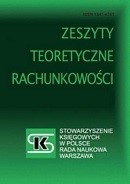Księgowość podwójna według Pacioliego i jego włoskich naśladowców z XVI i XVII wieku
Double-entry bookkeeping by Pacioli and his Italian followers in XVI–XVII century
Author(s): Monika Kowalska, Sławomir SojakSubject(s): Economy
Published by: Stowarzyszenie Księgowych w Polsce
Keywords: accounting manuals; Luca Pacioli; history of accounting; merchant accounting; accounts.
Summary/Abstract: The purpose of the article is to present the first textbook on double-entry bookkeeping and its impact on the development and popularization of accounting in Italy. The author of this work - Luca Pacioli – was an outstanding representative of the Renaissance, and thanks to Tractatus XI de Computis et Scripturis he became known as the „Father of Accounting”. His work was a compendium of knowledge necessary to keep merchant accounts. It was written on the basis of long-term observation of the practices used by Venetian merchants, who, due to intensive trade, were looking for a way to control the efficiency of their operations. The handbook’s quality made the rules of accounting which it described become a widely used standard reproduced in books by other authors. The first followers of Pacioli were Italians: Domenico Manzoni, Don Angelo Pietra and Matteo Mainardi, who mostly copied his textbook, but also tried to make their own improvements in accounting. In this way the knowledge of the double-entry bookkeeping system came to other countries and became the most popular method of accounting. Its simplicity and perfection allowed it to survive until XXI century.
Journal: Zeszyty Teoretyczne Rachunkowości
- Issue Year: 2015
- Issue No: 81
- Page Range: 155-180
- Page Count: 25

